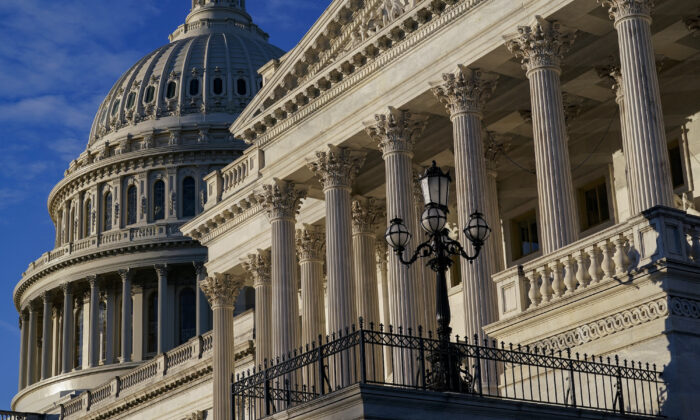 Light from the morning sun illuminates the Capitol in Washington on Dec. 3, 2021. (J. Scott Applewhite/AP Photo)
Beijing Threatens Congress
Light from the morning sun illuminates the Capitol in Washington on Dec. 3, 2021. (J. Scott Applewhite/AP Photo)
Beijing Threatens Congress
SENATOR SCHUMER’S BILL MAKES BEIJING SEE RED
Milton Ezrati
December 13, 2021
Epoch Times News Analysis PDF Audio
00:00
00:00
While Chinese leader Xi Jinping and U.S. President Joe Biden have talked (albeit remotely) about improving relations between their two countries, a new Sino-American battle has started.
On one side is the Foreign Affairs Committee of the National People’s Congress (
China’s rubber-stamp legislature), others in Beijing, and China’s Ambassador to the United States, Qin Gang. On the other side are Senate Majority Leader Chuck Schumer (D-N.Y.) and many in the U.S. Congress.
The issue is Schumer’s massive U.S. Innovation and Competition Act (USICA). The senator has put it forward as a cudgel with which to beat China on trade, technology, and cybersecurity attacks, among other things. The Chinese side has made it clear that if this bill becomes law, Beijing will retaliate.
Schumer’s massive bill (2,276 pages) passed the Senate in June 2021. It has yet to pass the House of Representatives. It very much reflects the growing anti-China sentiment in Congress, on both sides of the aisle, and gathers under its umbrella several smaller bills that had already been introduced. Prominent among these are the Endless Frontiers Act, originally put forward by Sen. Todd Young (R–Ind.), and the Meeting the Chinese Challenge Act, originally put forward by Senators Sherrod Brown (R–Ohio) and Pat Toomey (R-Pa).
The composite bill, not surprisingly, has a great variety of provisions. Among them, it would insist on “buy American.” It would ban to the extent legally possible the purchase of Chinese-made drones and electric vehicles, and forbid any government server to connect to a Chinese social network such as TikTok. It would include measures to thwart cybersecurity attacks on any U.S. government agency and mandatory sanctions in response to any Chinese cybersecurity attacks, as well as any state-sponsored thefts of intellectual property and technology. It is estimated to affect some $250 billion in trade and economic activity generally.
Beijing has vowed to retaliate should the bill become law. China’s Foreign Affairs Committee has described the USICA as an attempt to “contain China’s development under the banner of innovation and competition.” Though Beijing has yet to divulge how it would retaliate, few doubt, given its actions in the past, that it would hesitate to do so. Few, however, expect tariffs.
After the strains China suffered during the 2019 “trade war” between China and the Trump White House, the last thing Beijing wants is to move matters in that direction. And given the tough line taken by U.S. Trade Representative Katherine Tai in her recent talks with Vice Premier Liu He, Beijing knows that Washington could take that path again. China hands suspect that Beijing’s response would target exports of parts needed by domestic U.S. manufacturers.
While the nature of the threats remains vague, China’s Washington embassy has swung into action. Ambassador Qin Gang has expressed his outrage and that of his government. He has identified some 260 bills in Congress that he describes as having “negative China content.” He has summed them up, singling out the USICA, as an attempt to “hijack China-U.S. relations and gravely damage America’s own interests.” He has also marshalled his staff to lobby (threaten?) all U.S. firms of significance, but especially those that already have interests in China, to defeat Schumer’s bill and other pieces of legislation like it.
All this anxiety may go nowhere. The bill still waits a vote in the House, and Speaker of the House Nancy Pelosi has yet to indicate when or even if such a vote will take place. Congress has a great deal of business to complete, so this issue may wait quite a while to get her attention, much less the attention of Biden.
Indeed, should it pass the House and arrive at the president’s desk, there are no assurances that he will sign it into law. He has at times talked tough on China, but its wide range of provisions could easily run afoul of other administration initiatives or important cabinet secretaries. Still, it does seem as though Congress has the proverbial bit in its teeth when it comes to China, and with the mid-term election looming in 2022, all politicians will take note of the public’s clear anti-China feeling.
Milton Ezrati is a contributing editor at The National Interest, an affiliate of the Center for the Study of Human Capital at the University at Buffalo (SUNY), and chief economist for Vested, a New York-based communications firm. Before joining Vested, he served as chief market strategist and economist for Lord, Abbett & Co. He also writes frequently for City Journal and blogs regularly for Forbes. His latest book is “Thirty Tomorrows: The Next Three Decades of Globalization, Demographics, and How We Will Live.”
https://www.theepochtimes.com/beijin...s_4152657.html

